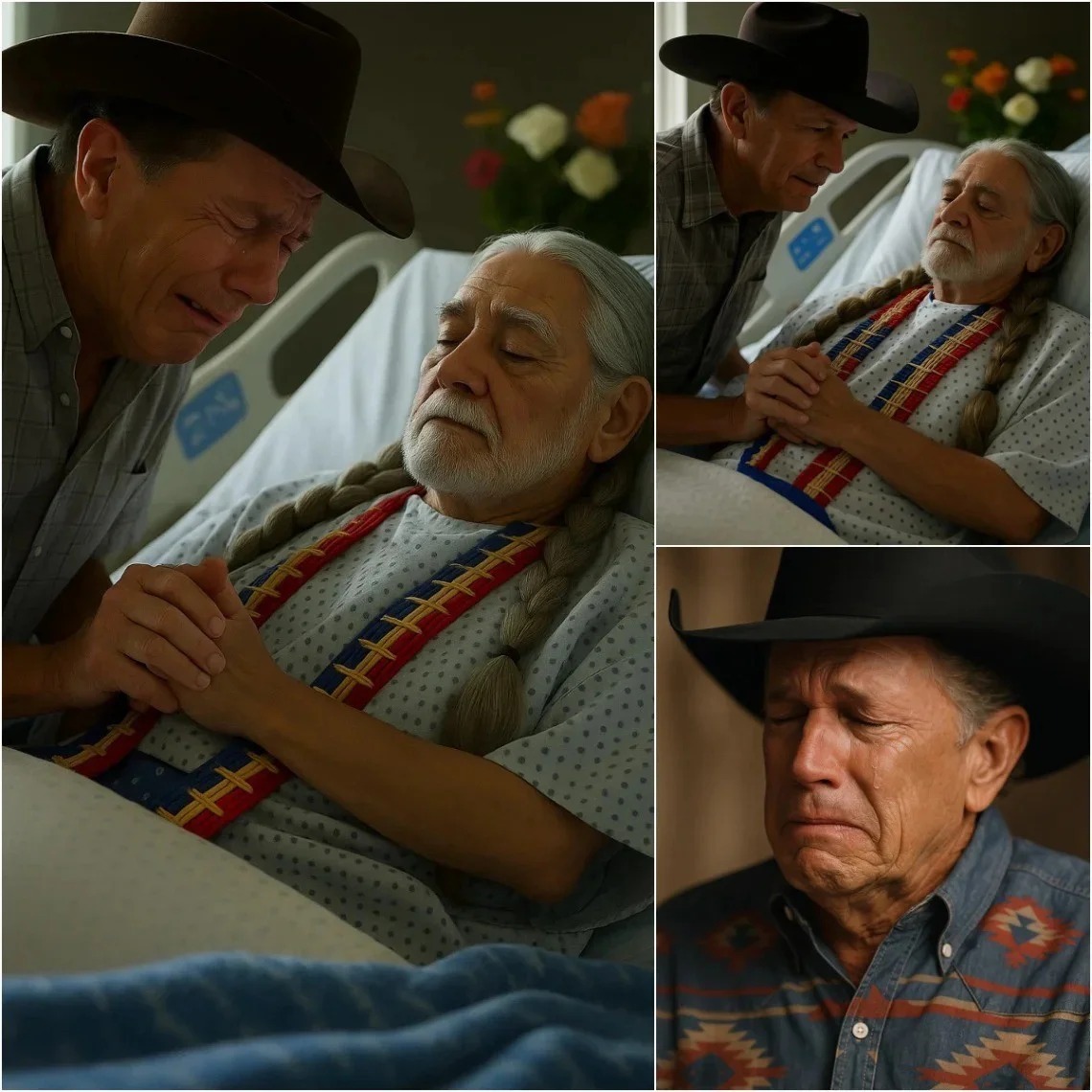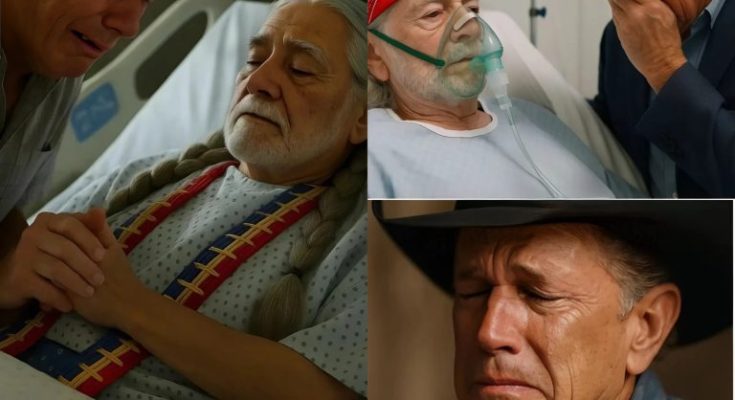In a moment that will go down as one of the most soul-stirring and humanizing events in country music history, George Strait — the “King of Country” and embodiment of stoic Texan strength — did something unimaginable: he cried on stage. And not just for himself. He cried for a friend, a legend, a brother in music — Willie Nelson.
During what was expected to be a triumphant final performance of Strait’s farewell tour in Arlington, Texas, fans witnessed something far deeper than music. They witnessed grief, confession, and a devastating revelation that turned a country concert into a national heartbreak.
And in doing so, Strait reminded us that behind the cowboy hat, behind the music and the mythos, lies a man — one who carries pain, guilt, and the burden of unspoken goodbyes.

A Final Tour With an Unexpected Ending
George Strait’s “Cowboys and Dreamers” tour had already been billed as the most emotionally charged tour of his career. With decades of hits, sold-out stadiums, and a fan base that spans three generations, Strait’s final bow was meant to be a celebration of legacy. But as he stepped to the microphone midway through the Arlington set, something shifted.
Gone was the effortless smile. Gone was the usual stage presence of a polished icon. Strait looked visibly shaken.
“I need to talk to y’all,” he said after finishing a haunting rendition of “Troubadour.” “I wasn’t sure I’d be able to get through this, but I can’t finish this night without saying something that’s been sitting heavy on my chest.”
And then, with a tremble in his voice, he spoke Willie Nelson’s name.
“I Let Time Get Away from Me…”
What followed was not a rehearsed tribute or carefully crafted announcement. It was raw. Human. Devastating.
“I’ve got a lot of regrets in my life, but the one I can’t stop thinking about lately is that I didn’t tell Willie enough how much I loved him — not as a musician, not as a legend — but as my friend.”
Strait then revealed what fans had feared but had not yet heard confirmed: Willie Nelson, now 91, is battling what doctors have described as a terminal respiratory illness. According to Strait, the Nelson family has kept details private — in keeping with Willie’s fiercely independent nature — but recently gave him permission to speak from the heart.
“They told me it’s getting bad. Real bad. Willie’s tired. He’s still that same fighter, but his body’s just not keeping up anymore,” Strait said, fighting back tears. “And the worst part is… I don’t know if I’ll get the chance to say goodbye in person.”

For an artist who built his persona around stoicism, Strait’s breakdown on stage stunned both his band and the thousands in attendance.
Willie Nelson: The End of an Era
For millions, Willie Nelson is more than a musician — he is Americana itself. The bandana, the braids, the beat-up guitar named Trigger — they are emblems of rebellion, artistry, and a stubborn refusal to be boxed in by labels. From “Always On My Mind” to “Blue Eyes Crying in the Rain”, his songs are stitched into the very fabric of American culture.
Yet behind the legend is a man who, by all accounts, has been fighting quietly. Friends say he insisted on continuing to write, play, and tour in recent years despite mounting health issues — chronic emphysema, lung fibrosis, and the wear-and-tear of a life lived on the road.
“He didn’t want the spotlight on his illness,” said a longtime associate. “Willie always said, ‘Let the music speak — not the medicine.’”
That decision, however, has left fans — and perhaps even close friends like George Strait — caught off guard by the severity of his condition.
A Complicated Friendship, A Bittersweet Farewell
Though George Strait and Willie Nelson were rarely seen as musical peers — Strait, the clean-cut traditionalist; Willie, the outlaw poet — their bond ran deep. Both were sons of Texas, both navigated the industry on their own terms, and both knew the price of fame.
Their collaborative track “Sing One With Willie” (2019) was a humorous and nostalgic acknowledgment of their decades-long relationship, and the moment they finally shared a studio. But according to Strait, they had plans for more music — plans that now may never materialize.
“I kept thinking we had time,” he told the crowd. “I figured we’d do another song, maybe one last show together. I just kept putting it off. And now… I don’t know.”
His voice cracked under the weight of the words, and the crowd — many of them sobbing — stood silently, some holding hands, some shining their phone lights upward in tribute.
It was more than a concert; it was a communal grieving.
Legacy, Regret, and the Cost of Silence
What made this moment so unforgettable wasn’t just the sorrow over Willie Nelson’s health. It was George Strait’s unfiltered honesty about regret — something so rarely admitted by men of their generation, especially in public.
In those few minutes on stage, Strait shattered the myth of the unbreakable cowboy. And in doing so, he gave thousands of fans permission to face their own regrets — the friends they haven’t called, the family they’ve grown distant from, the words left unsaid.
And for that, his confession became more than news. It became medicine.
What Now?
As of this writing, no formal statement has been made by the Nelson family. Those close to Willie say he remains at home in Spicewood, Texas, surrounded by loved ones and listening to music when he is able. “Trigger’s still by his side,” a family source said softly. “He smiles every time he hears someone play one of his songs.”
Fans around the world are rallying online, using the hashtag #SingForWillie to share their memories, cover songs, and tributes. The sentiment is unified: “Thank you for the songs. Thank you for the soul.”
As for George Strait, he ended the night in Arlington with a single encore: a stripped-down acoustic version of “Blue Eyes Crying in the Rain.” He didn’t sing the final verse. He let the crowd carry it.
And as he exited the stage, he didn’t wave. He placed his cowboy hat over his heart, bowed his head, and walked silently into the dark.



